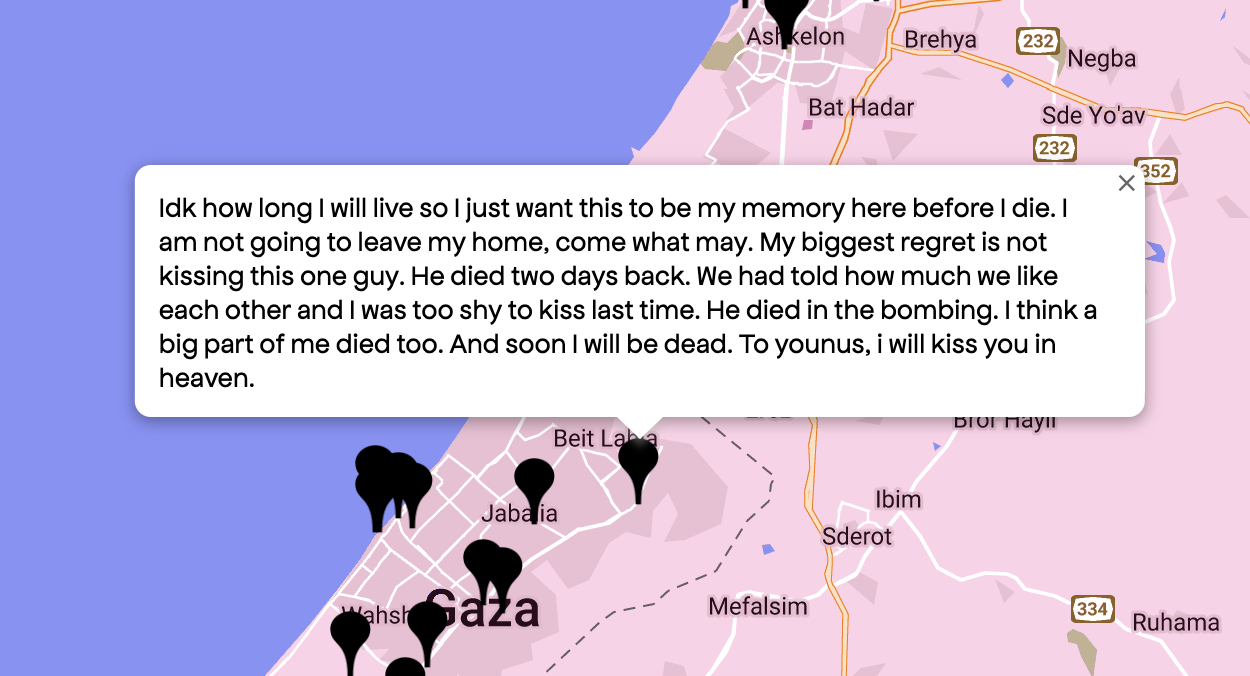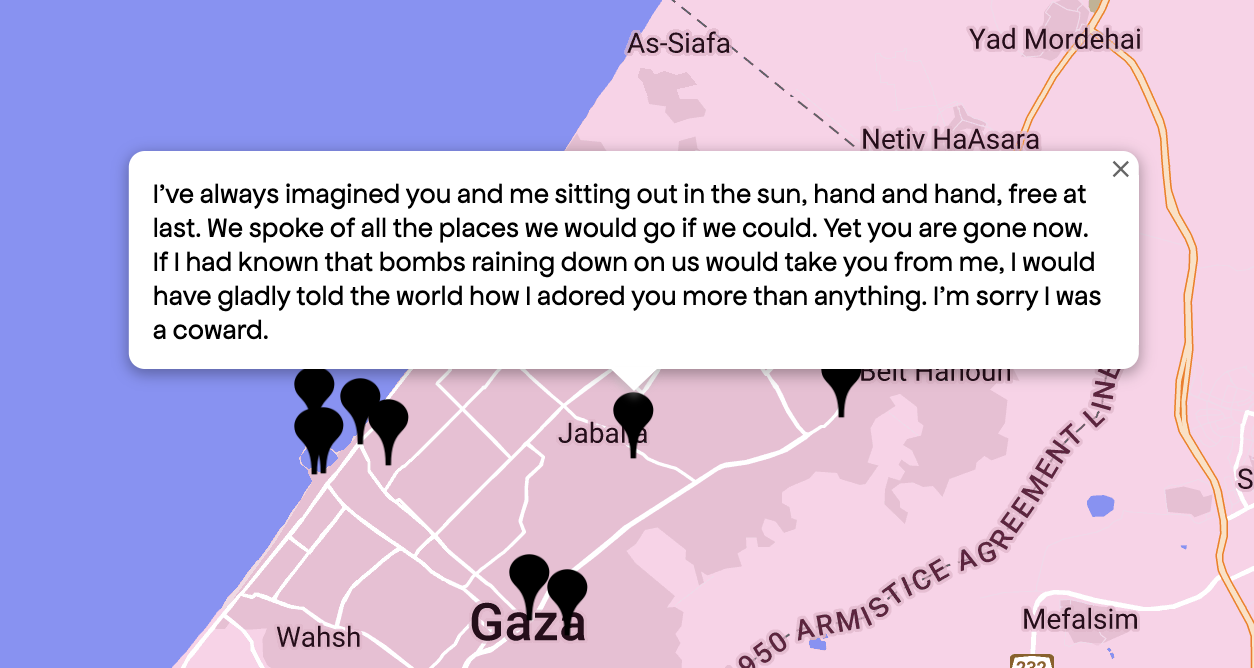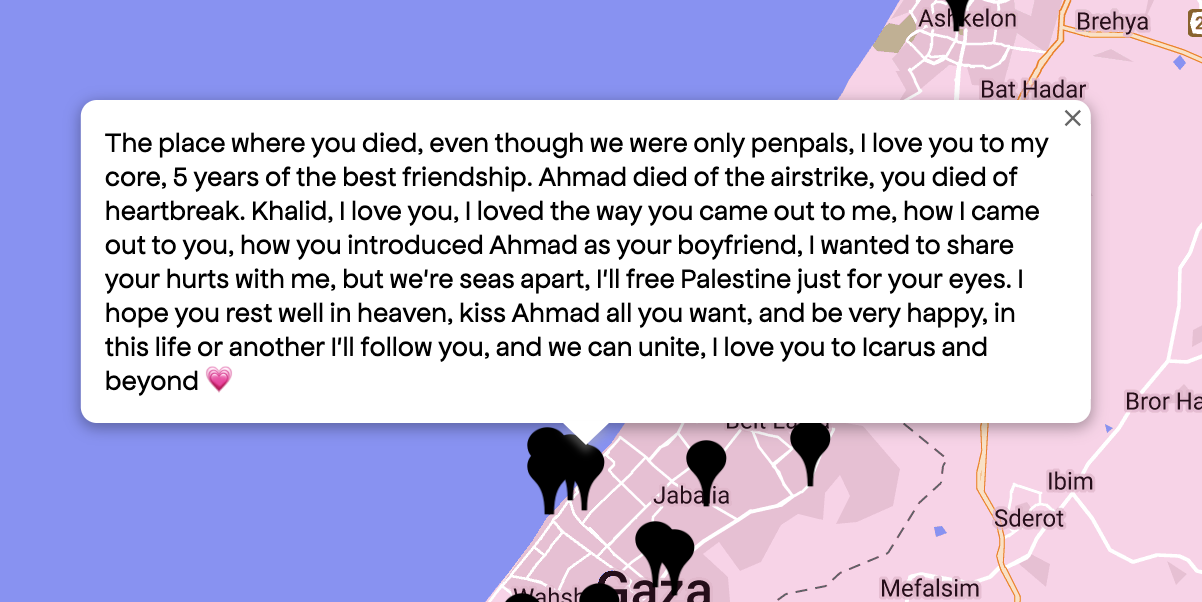If I Must Die You Must Live To Tell My Story:
On Grief and the Role of Queer Archives in the Palestinian Liberation Movement
- Nora Gallant Green
January 12, 2024
Beloved Palestinian poet, writer, activist, and educator Refaat Alareer was killed in an Israeli airstrike on December 7th. His poem “If I Must Die” was written in 2011, but in the month before his death, Alareer posted it to his Twitter account and it has been shared across social media to honor him. The first three lines are a call to action, particularly for those of us who are not Palestinian, and witnessing the ongoing genocide in Gaza: “If I must die you must live to tell my story” (Alareer). As millions of us across the world mobilize to end this genocide, we must both act and take time to hold the grief of the murder of over 22,000 people in just three months.
The way I am making space for grief is by seeking out the stories of those who have been killed. Collecting stories is a refusal of numbness. It is a practice of refusing to let people disappear into cold, impersonal statistics. As Palestinian poet and writer Nour al-Din Hajjaj, who was killed by an Israeli airstrike in his home on December 2nd, wrote: “I am not a number and I do not consent to my death being passing news. Say, too, that I love life, happiness, freedom, children’s laughter, the sea, coffee, writing, Fairouz, everything that is joyful” (Sheehan, 2023). To both Refaat Alareer and Nour al-Din Hajjaj, there is power in remembering. As Jamaican American poet, writer, and activist June Jordan once wrote: “I got to thinking about how some of us choose to remember, and why, and how… And what it means to forget, what it means to fail to find and preserve the connection with the dead whose lives [we] want or need to honor with our own” (Art, 2019). In a world where people are still arguing whether or not the indiscriminate killing of over 22,000 civilians in 90 days constitutes genocide, preserving the stories of the dead is crucial.
During the Holocaust, Polish Jews living in the Warsaw Ghetto buried their accounts of the violence they experienced under the Nazi regime. They knew they might not survive but they hoped that their stories would. Dawid Graber, a 19-year-old resident of the ghetto, wrote this before he buried the archive: “What we’ve been unable to shout out to the world, we buried in the ground” (Jewish). For those of us who live at the margins, whose stories are so often scrubbed from the “official” archives, this form of community archiving is very familiar.
Instead of burying their stories in the earth, Palestinians are uploading them to social media. Queer and trans Palestinians have turned to sites like Queering the Map to hold their stories. Queering the Map is a community-based online archive that maps queer presence and experiences spatially. It refutes the dominant narrative which aims to erase queer presence entirely or categorize us as marginal and geographically constricted. This counter-narrative is particularly potent in the context of the Israeli state, which has consistently attempted to weaponize queerness to deter support for Palestine and critique of the settler colonial project. As the activist collective Queers in Palestine wrote, Israel uses colonial dichotomies like “civilized” versus “barbaric” to dehumanize Palestinians and justify their attacks on Palestinians (Queers). Part of this discourse is Israel’s assertion that queer people are safe in Israel, whereas there are no queer people in Palestine because it is not safe to be queer there. This is a denial of the homophobia of Israeli society (for more information look at the Mesarvot Network, a majority queer grassroots organization that supports Israelis who refuse to serve in the military) as well as the constant violence that all Palestinians experience under the Israeli state, but it is also an erasure of queer Palestinian communities that are, and have always been, actively fighting for their freedom. As the Queers in Palestine collective argue,
In the face of this state-sponsored erasure, community archives like Queering the Map and grassroots organizations like Queers in Palestine and alQaws (a queer Palestinian organization based in Jerusalem) are incredibly important forms of resistance. Queering the Map was started in 2017 and to date includes approximately 400,000 entries in 26 languages in countries worldwide. Below are three testimonies written by queer Palestinians in Gaza. They are not dated but are believed to have been posted within the first few weeks of the war when there was more reliable access to the internet. All three posts are love letters to people who have been killed in Israeli airstrikes.



There is an old Jewish saying that each life extinguished is an entire world extinguished. Stories like these make these worlds visible to us, those who bear witness to crisis. The writers posted them because they were going through incredible loss and they wanted someone to read their stories. The writers of the first two posts were in Gaza: they knew they might not survive, that the bombs that killed their lovers might kill them as well. The reality is that for queer people, it is not always safe to be loud about who we love. Maybe the writers could not tell those around them that they lost a lover, not a friend, and maybe that lover was the only person they were out to. Regardless, what matters most to me is that they lived and loved and the grief of that love and life being taken away.
These stories create an archive that refuses their erasure, primarily as Palestinians but also as queer people whose presence is so often scrubbed from the records. The Israeli propaganda machine, with the support of Western mainstream media, has long attempted to dehumanize Palestinians, even to the point of denying their existence. The current genocide is a very visceral example of the project of erasure and part of fighting for the living is remembering the dead.
Reading poetry, essays, books by Gazan writers, learning the names, faces, dreams of the community, the heartbreak and excitement of first love, is one way to honor them. Reading stories like these on Queering the Map, and really feeling the weight of the loss of each life, is a refusal to become numb to loss and instead to honor it. As anarchist, queer, anti-Zionist Jewish organizer Cindy Milstein reminds us, all movements come from grief. Organizing is losing someone or something and refusing to lose more. Organizing is fighting for liberation and honoring those who do not survive to see liberation come. After all, as anarchist labor organizer Patrick O’Donogue wrote (2017), we do not ask for martyrs. We prefer our comrades, lovers, and friends to be beside us, creating the “spaces and struggles of our liberation. The tragedies ended our comrades’ lives, but not the visions they lived for.”
Works Cited
Alareer, R. [@itranslate123]. (2023, November 1). If I must die [Tweet]. Twitter. https://twitter.com/itranslate123?lang=en.
alQaws. (2020, October 18). Beyond Propaganda: Pinkwashing as Colonial Violence. alQaws. http://www.alqaws.org/siteEn/print?id=86&type=1.
Art Stuff Matters. (2019, January 15). Remembering as Living, as Moving Forward. Art Stuff Matters. https://artstuffmatters.wordpress.com/2019/01/15/remembering-as-living-as-moving-forward/
Jewish Historical Institute. (n. d.). 'What we’ve been unable to shout out to the world' – permanent exhibition. The Emanuel Ringelblum Jewish Historical Institute.
Milstein, C. (2017). Cracks in the Wall. In C. Milstein (Eds.), Rebellious Mourning: The Collective Work of Grief (pp. 1-12). AK Press.
O’Donoghue, P. (2017). Seeds Beneath the Snow: Anarchists Mourn Our Dead. In C. Milstein (Eds.), Rebellious Mourning: The Collective Work of Grief (pp. 405-412). AK Press.
Queers in Palestine. (n.d). No Pride with Genocide! Queers in Palestine. https://queersinpalestine.noblogs.org/post/2023/11/19/no-pride-with-genocide/.
Sheehan, D. (2023, December 21). These are the poets and writers who have been killed in Gaza. Literary Hub. https://lithub.com/these-are-the-poets-and-writers-who-have-been-killed-in-gaza/.
The way I am making space for grief is by seeking out the stories of those who have been killed. Collecting stories is a refusal of numbness. It is a practice of refusing to let people disappear into cold, impersonal statistics. As Palestinian poet and writer Nour al-Din Hajjaj, who was killed by an Israeli airstrike in his home on December 2nd, wrote: “I am not a number and I do not consent to my death being passing news. Say, too, that I love life, happiness, freedom, children’s laughter, the sea, coffee, writing, Fairouz, everything that is joyful” (Sheehan, 2023). To both Refaat Alareer and Nour al-Din Hajjaj, there is power in remembering. As Jamaican American poet, writer, and activist June Jordan once wrote: “I got to thinking about how some of us choose to remember, and why, and how… And what it means to forget, what it means to fail to find and preserve the connection with the dead whose lives [we] want or need to honor with our own” (Art, 2019). In a world where people are still arguing whether or not the indiscriminate killing of over 22,000 civilians in 90 days constitutes genocide, preserving the stories of the dead is crucial.
During the Holocaust, Polish Jews living in the Warsaw Ghetto buried their accounts of the violence they experienced under the Nazi regime. They knew they might not survive but they hoped that their stories would. Dawid Graber, a 19-year-old resident of the ghetto, wrote this before he buried the archive: “What we’ve been unable to shout out to the world, we buried in the ground” (Jewish). For those of us who live at the margins, whose stories are so often scrubbed from the “official” archives, this form of community archiving is very familiar.
Instead of burying their stories in the earth, Palestinians are uploading them to social media. Queer and trans Palestinians have turned to sites like Queering the Map to hold their stories. Queering the Map is a community-based online archive that maps queer presence and experiences spatially. It refutes the dominant narrative which aims to erase queer presence entirely or categorize us as marginal and geographically constricted. This counter-narrative is particularly potent in the context of the Israeli state, which has consistently attempted to weaponize queerness to deter support for Palestine and critique of the settler colonial project. As the activist collective Queers in Palestine wrote, Israel uses colonial dichotomies like “civilized” versus “barbaric” to dehumanize Palestinians and justify their attacks on Palestinians (Queers). Part of this discourse is Israel’s assertion that queer people are safe in Israel, whereas there are no queer people in Palestine because it is not safe to be queer there. This is a denial of the homophobia of Israeli society (for more information look at the Mesarvot Network, a majority queer grassroots organization that supports Israelis who refuse to serve in the military) as well as the constant violence that all Palestinians experience under the Israeli state, but it is also an erasure of queer Palestinian communities that are, and have always been, actively fighting for their freedom. As the Queers in Palestine collective argue,
This over-fixation on the supposed lack of Palestinian queer visibility steers the attention from Israel’s campaign against all Palestinians – workers, activists, students, feminists, queers, and otherwise. Israel and its allies dangerously decontextualize the violence queers suffer from its historical colonial roots, and dissociate it from the impacts of current settler-colonial violence. This is an attempt to portray Palestinian society as unsafe for queers to legitimize the annihilation of our people, and in turn our annihilation as queers.
In the face of this state-sponsored erasure, community archives like Queering the Map and grassroots organizations like Queers in Palestine and alQaws (a queer Palestinian organization based in Jerusalem) are incredibly important forms of resistance. Queering the Map was started in 2017 and to date includes approximately 400,000 entries in 26 languages in countries worldwide. Below are three testimonies written by queer Palestinians in Gaza. They are not dated but are believed to have been posted within the first few weeks of the war when there was more reliable access to the internet. All three posts are love letters to people who have been killed in Israeli airstrikes.
There is an old Jewish saying that each life extinguished is an entire world extinguished. Stories like these make these worlds visible to us, those who bear witness to crisis. The writers posted them because they were going through incredible loss and they wanted someone to read their stories. The writers of the first two posts were in Gaza: they knew they might not survive, that the bombs that killed their lovers might kill them as well. The reality is that for queer people, it is not always safe to be loud about who we love. Maybe the writers could not tell those around them that they lost a lover, not a friend, and maybe that lover was the only person they were out to. Regardless, what matters most to me is that they lived and loved and the grief of that love and life being taken away.
These stories create an archive that refuses their erasure, primarily as Palestinians but also as queer people whose presence is so often scrubbed from the records. The Israeli propaganda machine, with the support of Western mainstream media, has long attempted to dehumanize Palestinians, even to the point of denying their existence. The current genocide is a very visceral example of the project of erasure and part of fighting for the living is remembering the dead.
Reading poetry, essays, books by Gazan writers, learning the names, faces, dreams of the community, the heartbreak and excitement of first love, is one way to honor them. Reading stories like these on Queering the Map, and really feeling the weight of the loss of each life, is a refusal to become numb to loss and instead to honor it. As anarchist, queer, anti-Zionist Jewish organizer Cindy Milstein reminds us, all movements come from grief. Organizing is losing someone or something and refusing to lose more. Organizing is fighting for liberation and honoring those who do not survive to see liberation come. After all, as anarchist labor organizer Patrick O’Donogue wrote (2017), we do not ask for martyrs. We prefer our comrades, lovers, and friends to be beside us, creating the “spaces and struggles of our liberation. The tragedies ended our comrades’ lives, but not the visions they lived for.”
Works Cited
Alareer, R. [@itranslate123]. (2023, November 1). If I must die [Tweet]. Twitter. https://twitter.com/itranslate123?lang=en.
alQaws. (2020, October 18). Beyond Propaganda: Pinkwashing as Colonial Violence. alQaws. http://www.alqaws.org/siteEn/print?id=86&type=1.
Art Stuff Matters. (2019, January 15). Remembering as Living, as Moving Forward. Art Stuff Matters. https://artstuffmatters.wordpress.com/2019/01/15/remembering-as-living-as-moving-forward/
Jewish Historical Institute. (n. d.). 'What we’ve been unable to shout out to the world' – permanent exhibition. The Emanuel Ringelblum Jewish Historical Institute.
Milstein, C. (2017). Cracks in the Wall. In C. Milstein (Eds.), Rebellious Mourning: The Collective Work of Grief (pp. 1-12). AK Press.
O’Donoghue, P. (2017). Seeds Beneath the Snow: Anarchists Mourn Our Dead. In C. Milstein (Eds.), Rebellious Mourning: The Collective Work of Grief (pp. 405-412). AK Press.
Queers in Palestine. (n.d). No Pride with Genocide! Queers in Palestine. https://queersinpalestine.noblogs.org/post/2023/11/19/no-pride-with-genocide/.
Sheehan, D. (2023, December 21). These are the poets and writers who have been killed in Gaza. Literary Hub. https://lithub.com/these-are-the-poets-and-writers-who-have-been-killed-in-gaza/.